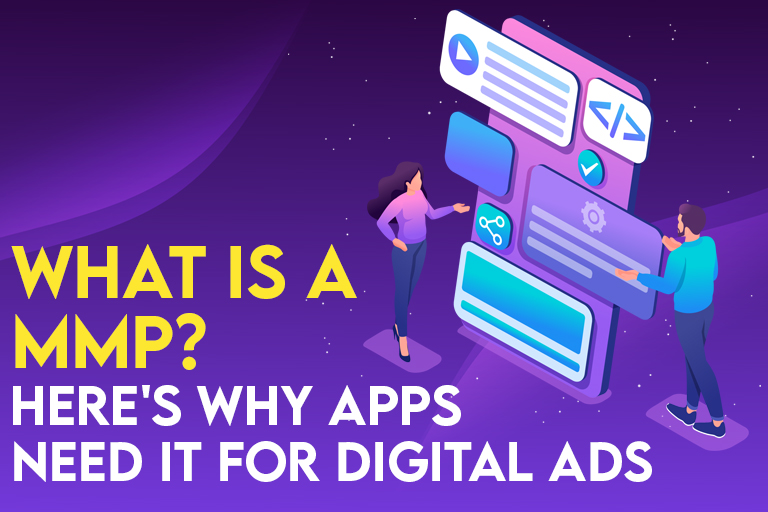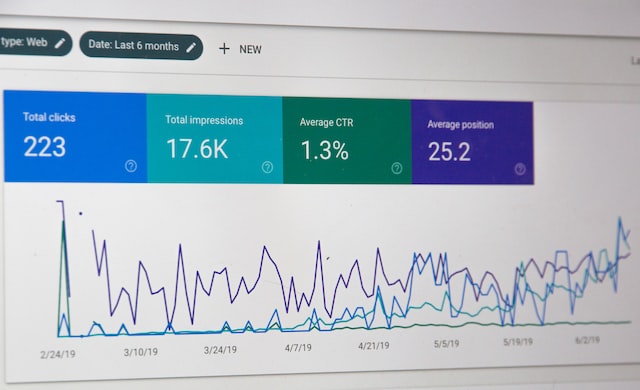
Let’s say you’re trying to promote an app through a digital marketing campaign. You create an ad campaign and start running ads on platforms like TikTok, Facebook, Google, and so forth. But how do you know if your ads are effective? You could spend lots of time and resources combing through data and attempting to attribute each app download to a specific ad. But this approach poses two problems. Firstly, it’s very time-consuming. Secondly, it’s likely to be wildly inaccurate. So, is there a better way? Yes! This is where a mobile measurement platform, or MMP, comes in.
What is an MMP?
A Mobile Measurement Partner (MMP) is a piece of third-party software that helps app developers to track and measure the performance of their digital marketing campaigns. They allow marketers to attribute actions such as app instals and in-app purchases to specific marketing campaigns. Additionally, they also provide detailed insights into how these campaigns are performing. This means marketers can see which platforms are delivering the highest-quality traffic, and they can adjust their budgets accordingly.
This data is absolutely essential for running effective digital marketing campaigns. Without an MMP, app developers would be flying blind. They would have no way of knowing which platforms are the most effective for promoting their app or which ad campaigns are attracting the most users.

How do MMPs Work?
SDK
MMPs typically work by providing app developers with a Software Development Kit (SDK) that they can integrate into their app. Once the SDK is in place, it will start collecting data on things like which ads are being shown to users. It’ll also show whether or not they result in a conversion (such as an app install). This data is then sent back to the MMP where it can be analysed and used to generate insights.
“For every client action, there are likely to be a number of triggers besides the last touch that played a role in influencing the consumer, and our new Multi-Touch Attribution tool allows advertisers to make the right decisions based on facts and not on assumptions.” – Oren Kaniel, AppsFlyer CEO.
Probabilistic Modelling
MMPs also use a form of probabilistic modelling to attribute conversions to specific marketing campaigns. This means that they take into account a range of factors (such as the timing of the conversion and the platforms where the ad was shown) in order to attribute the conversion to a particular campaign.
Last Touch Attribution
Most MMPs use a “last touch attribution model”. This means they attribute the conversion to the last marketing campaign the user was exposed to before the conversion occurred. However, according to AppsFlyer — one of the market’s most popular MMPs — this is not the most accurate attribution model.
The customer journey is often not the most linear. A user may have been exposed to multiple marketing campaigns before finally converting. For this reason, AppsFlyer uses what’s known as a “multi-touch attribution model”. This means they take into account every touchpoint in the user journey. It extends from when they first see an ad, until they eventually convert. “For every client action, there are likely to be a number of triggers besides the last touch that played a role in influencing the consumer, and our new Multi-Touch Attribution tool allows advertiser to make the right decisions based on facts and not on assumptions”, explains AppsFlyer’s CEO Oren Kaniel.
All-in-All
It makes sense that MMPs are moving towards a “multi-touch attribution” model. This is considering that the typical user journey consists of between 5 and 20 touch points on average before you can even make a sale. According to Insider Intelligence, marketers are starting to take this into account. 65.7% of US companies are using a multi channel attribution model in 2022. This is a modest increase of 5.7% since 2019. However, it shows an upward trend towards the acknowledgement of the complexities of accurate attribution.
Whichever way your MMP calculates attribution, it’s still a probabilistic model. It’s important to remember that it’s not an exact science. However, it’s the best way to attribute conversions in a complex multi-touch digital world.
“These metrics are all well and good, but they only give you a limited picture of how your ad campaign is performing. A mobile measurement partner will collect this data and use it to attribute conversions to specific marketing campaigns. This means you not only see how many people are seeing and clicking your ad, but also how many people are taking the desired action (such as downloading your app).”

What Does an MMP Measure?
If you’re using an ad platform like TikTok or Facebook, you’ll have access to certain ad performance metrics. This includes:
- Impressions
- Reach
- Clicks
- CTR
- Cost per click (CPC)
- Cost per thousand impressions (CPM)
These metrics are all well and good, but they only give you a limited picture of how your ad campaign is performing. A mobile measurement partner will collect this data and use it to attribute conversions to specific marketing campaigns. This means you not only see how many people are seeing and clicking your ad, but also how many people are taking the desired action (such as downloading your app). Generally, an MMP will provide you with the following data:
- App instals
- In-app purchases
- Registrations
- Subscriptions
- Custom events
- Source of traffic
- Cost per install (CPI)
With this information, you can extrapolate plenty of useful insights such as:
- Return on ad spend (ROAS)
- Lifetime value (LTV)
- Cost per action (CPA)
This data is essential for making informed decisions about your app promotion strategy. You can use these insights to optimise your ad campaigns and ensure you’re getting maximum value from your ad spend.

What Platforms do MMPs Integrate With?
MMPs typically integrate with ad platforms and analytics tools. This allows them to collect data on things like ad impressions and clicks, as well as conversions such as app instals. Some of the most popular platforms that MMPs integrate with include:
- TikTok
- Google Ads
- Snapchat
It’s important to note that not all MMPs are created equal. Some platforms only integrate with a limited number of ad platforms, while others have a more comprehensive approach. Make sure to do your research and choose an MMP that will work well with the platforms you’re using.
Why Do We Need to Use an MMP?
In case it wasn’t already clear, MMPs are absolutely essential for running effective digital marketing campaigns. If you need any more convincing, here are some key reasons why you should be using a mobile measurement partner.
Accuracy
When it comes to app marketing, accuracy is essential. You need to know which ad campaigns are performing well and which ones aren’t. This way you can adjust your budget accordingly. With an MMP, you can be sure that the data you’re looking at is accurate and reliable.
Optimisation
Testing and learning are a huge part of any digital marketing campaign. MMPs make this process much easier by giving you the ability to track and compare the performance of different ad campaigns.
Increased ROAS
At the end of the day, the goal of any digital marketing campaign is to generate a return on your ad spend (ROAS). MMPs provide you with essential insights such as cost per install (CPI), cost per action (CPA), and lifetime value (LTV). With this data, you can calculate your ROAS and make sure that your ad campaigns are performing optimally.
Unified Insights
If you’re running ad campaigns on multiple platforms, it can be difficult to get a clear picture of your overall performance. MMPs collect data from all of your ad campaigns and present it in a unified dashboard.
Identify Fraud
Fake clicks and instals can be a problem in the world of digital marketing. MMPs use a variety of methods to prevent fraud and ensure that the data they collect is accurate. This includes things like verifying device IDs and using IP blacklisting.

11 Examples of Popular MMPs
There are numerous MMPs on the market, each with its own unique features and pricing structure. Here are 11 of the most popular ones.
1. AppsFlyer
With ten years’ experience providing MMP solutions, AppsFlyer is one of the most established and popular players in the space. They currently offer their attribution solutions to a wide number of high-profile clients such as Snapchat, Cocacola, Nike and KFC. With the approval of so many big names, it’s clear that they have positioned themselves as a highly trusted partner. One of their unique selling points is their strong emphasis on privacy and security.
2. Singular
Singular is another well-established mobile measurement partner that has been in business for over eight years. They have a wide range of satisfied clients, including Lyft, Warner Brothers and Microsoft. Singular’s platform offers a number of essential features such as custom reporting, fraud prevention and real-time data streaming. They offer flexible pricing models. This allows clients to pay by either ad spend or conversions, depending on what works for their business.
3. Branch
Like Singular, Branch was also launched just over eight years ago. During this time, they have managed to acquire over 3 billion monthly users. Their innovative attribution solution has made them a popular choice for many big names, such as Shopify, Reddit and Amazon Music. The platform has a number of features that are designed to help brands grow their mobile businesses. This includes deep linking, attribution, and personalisation.

4. CAKE
CAKE is a well-established provider of marketing attribution software, with over ten years of experience in the industry. They have a long list of satisfied clients, including Forex Club, Roblox, Lyft and Atlantic Coast Media Group. CAKE is not just a Mobile Measurement Partner either. They also offer a number of other solutions such as an affiliate platform and a fraud prevention tool. Their SDK is available for both iOS and Android. This makes it easy to integrate their attribution solution into your mobile app.
5. TapStream
TapStream is a popular mobile measurement partner trusted by big-name brands such as Twitch and Microsoft. They boast simple SDK integration and real-time data streaming as two of their key features. The platform also offers several other essential features such as turnkey referral programs, an onboarding tool and campaign landers. TapStream’s pricing model is based on a monthly fee, with discounts available for customers who prepay a year in advance.
6. Tenjin
Tenjin is a popular choice for game publishers with clients such as RubyGames, SayGames and HomaGames among their customer base. The platform offers a wide range of features, including attribution, in-app analytics, marketing automation, and user segmentation. One of Tenjin’s unique selling points is that users can start off on a free plan, including 100,00 events per month. As user needs grow, they can upgrade to one of the paid plans starting at $300 per month.
7. Revenue Cat
Revenue Cat is a newer player in the MMP space. However, they have already made a big splash with their innovative attribution solution. Popular with smaller startups and indie developers, some of their clients include Cameo, Brainly and Photoroom. Revenue Cat’s platform offers a number of features such as in-app purchases, subscription management and customer insights. Their fees are charged according to your Monthly Tracked Revenue. This means you only start paying money when you start making money.

8. Adjust
Adjust is a German company founded in 2012, so they are one of the older MMPs on this list. They have over 50,000 clients, including Nescafe, Duolingo and Vinted. They have made great efforts to keep their solutions simple and intuitive, with an easy-to-use interface and clear pricing plans. Their platform offers all of the usual features you would expect from an MMP. This includes ROI insights, in-app analytics, and CTV and OTT data.
9. Airbridge
Airbridge is a South Korean MMP that has been in business since 2013. They have over 200+ clients, including Samsung, KBank and SK Telecom. Airbridge’s platform has proved a popular choice across the banking and security sector, with a number of high-profile clients in these industries. The platform unifies both web and mobile attribution under a single customer identity. This makes it easy to get a holistic view of your marketing efforts.
10. Localytics
Localytics (developed by Upland Software) is a popular MMP with over 18,000 clients including Comcast, Verizon and Bed Bath & Beyond. They market themselves as an all-in-one mobile marketing solution, providing clients with everything they need to drive growth and engagement. They put intelligent personalisation at the forefront of their offering, with features like user advanced segmentation and A/B testing.
11. Kochava
Kochava position themselves as the one partner to measure everything. Their flexible and scalable solution has made them a popular choice with enterprise-level businesses like Uber, Mcdonald’s, and Dunkin’ Donuts. Kochava’s platform includes everything an app developer needs to measure and optimise their user acquisition efforts. This includes attribution, in-app analytics, and fraud prevention.

12 Tips for choosing a mobile measurement partner (MMP)
Here are some tips for choosing a mobile measurement partner (MMP):
- Determine your measurement needs: Before you start looking for an MMP, it’s important to have a clear understanding of your measurement needs. This will help you narrow down your options and choose an MMP that can provide the specific data and insights you need.
- Look for an MMP that is accredited by industry standards organizations: There are several industry standards organizations, such as the Media Rating Council (MRC), that accredit MMPs based on their data accuracy and reliability. Choosing an MMP that is accredited by these organizations can help ensure that you are getting high-quality data.
- Consider the MMP’s technology and data sources: It’s important to choose an MMP that has a robust and reliable technology platform, as well as access to a wide range of data sources. This will ensure that you are getting a comprehensive view of your mobile marketing efforts.
- Read reviews and ask for references: Before making a decision, it’s a good idea to read reviews from other companies that have worked with the MMP, and ask for references from the MMP themselves. This can give you a sense of their level of service and expertise.
- Consider the MMP’s pricing and contract terms: Make sure to carefully review the MMP’s pricing and contract terms before making a decision. It’s important to choose an MMP that fits within your budget, and that has terms that are fair and reasonable.
- Look for an MMP that offers data privacy and security: It’s important to choose an MMP that takes data privacy and security seriously, and has measures in place to protect your data. This can help ensure that your data is handled responsibly and in compliance with relevant laws and regulations.
- Consider the MMP’s customer support: It’s a good idea to choose an MMP that offers reliable and responsive customer support. This can be especially important if you have any questions or issues that need to be resolved.
- Look for an MMP that can help you optimize your mobile marketing efforts: In addition to providing data and insights, a good MMP can also help you optimize your mobile marketing efforts. Look for an MMP that offers resources and tools to help you analyze your data and make informed decisions about your mobile marketing strategy.
- Check if the MMP is integrated with other platforms: If you are using other marketing platforms, such as a customer relationship management (CRM) system or an email marketing platform, it can be helpful to choose an MMP that is integrated with these platforms. This can make it easier to access and analyze your data, and to create more cohesive and effective marketing campaigns.
- Look for an MMP that offers flexible reporting options: Choose an MMP that offers a variety of reporting options, such as custom reports, real-time data, and offline data integration. This can help you get the insights you need to make informed decisions about your mobile marketing efforts.
- Consider the MMP’s specialization: If you have a specific industry or niche that you are targeting, it can be helpful to choose an MMP that has expertise in that area. This can help ensure that you are getting data and insights that are relevant and applicable to your business.
- Look for an MMP that offers a range of measurement capabilities: Depending on your specific needs, you may want to choose an MMP that offers a range of measurement capabilities, such as app installation tracking, in-app event tracking, and attribution modeling. This can help ensure that you are getting a comprehensive view of your mobile marketing efforts.
Don’t Miss Critical Data – Start Working with an MMP
If you’re looking for a comprehensive mobile marketing solution, it’s worth considering an MMP. Not only do they provide all the features you need to measure and optimise your campaigns, but they also offer invaluable insights into how users interact with your app. At House of Marketers, we’re constantly working with MMPs to bring our clients the best possible mobile marketing solutions. If you’re interested in learning more about what an MMP can do for your business, get in touch today. Our friendly team will be happy to walk you through the ins and outs of using a Mobile Measurement Partner.